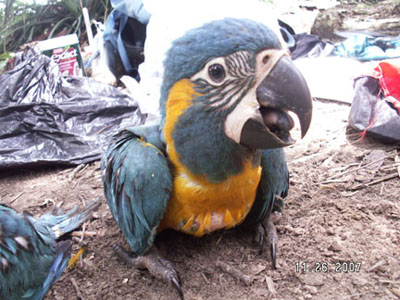The newly-fledged Blue-throated Macaw, Goliath, is improving his flight skills bit by bit. Now his little brother Manu thinks he’s ready to take the leap…
December 23rd 2007
On the evening of the 21st I located Goliath with his parents, perched amid the leaves of a small tree at the east edge of the island. I was very relieved to find him there, considering his poor flight skills when he left the nest two days earlier. Yesterday and today (the 22nd and 23rd) I heard him at the west end of the island, begging from his parents, so he must be getting around alright.
Yesterday evening as I was watching the nest, little Manu decided that his time had come and out of the nest cavity he climbed, taking the same shaky steps up the nearly vertical trunk as his brother had three days earlier. And, ironically, just as his brother did three days earlier, he tripped and fell out of the tree, crash-landing in the bushes. I gathered the angry, screeching chick up in my extra shirt and carried him back to camp to get the climbing equipment. Vicente, swinging in his hammock, looked at me curiously as I walked down the path into camp, carrying a shrieking bundle in my arms. We weighed Manu and them rushed back to the nest with the equipment, completing our task as quickly as possible, both to minimize the stress on Manu and because 7:00 p.m. (our daily radio-communication hour) was rapidly approaching. "Casi de noche," remarked Vicente, shaking his head. Not too smart for Manu to fledge at dusk, especially since for these chicks, to fledge is to fall to the ground. Upon returning to the camp we talked to Carmen by radio. She is in Trini (Trinidad, the capital of the Beni) and will stay there until the 27th to meet Steve and fly with him to Veintiuno. Poor Carmen, alone in Trini over Christmas. And poor Steve, alone, who-knows-where, trying to get to Trini! He was supposed to arrive on the 19th or the 20th. The latest news is that he will arrive on the 26th.
So now I sit in the blind, watching the nest where Manu is sitting tight. Vicente and I were sure that he would re-fledge early this morning, especially since Goliath re-fledged very quickly after being put back in his nest. Vicente arrived at the blind at 6 a.m. and watched until 8:30, hoping to see Manu fledge. It is now almost 10:30 and Manu is still in the nest.
The parents haven't been around much and I don't believe a chick would leave its nest without the parents present, so this could be a factor in Manu's apparent reluctance to leave this morning. It is interesting to note that when Manu climbed out of the nest yesterday the adults, though present, did not fly to him and preen him or feed him as I observed with Goliath. They stayed a short distance away, cawing quietly, and Manu had been out of the nest for less than five minutes when we fell. Silly bird. I joked with Vicente that a new, ground-dwelling sub-species of Blue-throated Macaw is evolving-Barba Azul Corre-por-suelo. "The chicks think it's normal for Blue-throated Macaws to spend time on the ground," I joked, referring to the chicks' weekly "ground time" when they are lowered from their nests for measurement and health checks. "They say, 'every few days we wander around on the ground y no pasa nada' (i.e. when we take them to the ground to measure them during nest checks). They don't realize that normally BTMs do not run around on the ground."
Of course, in reality it is not a joking matter, but rather something that is both concerning (from a conservation point of view) and interesting to me as a scientist. How common is it for macaw chicks (or other parrot chicks) to fledge onto the ground and climb their first tree, rather than flying into it from the nest? In Argentina I observed two out of 17 radio-collared Blue-fronted Amazon chicks fledge onto the ground, and both of these birds survived for the entire study period (2 months) without intervention. Non-intervention is a risk we can’t afford to take with a critically endangered species, such as the Blue-throated Macaw, but the question remains open as to how rare it really is for a macaw chick to end up on the ground in the day or two after fledging.
--small.jpg)

--small.jpg)
































